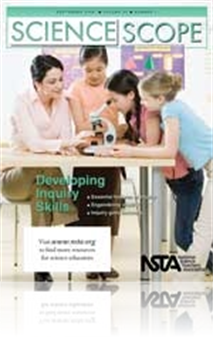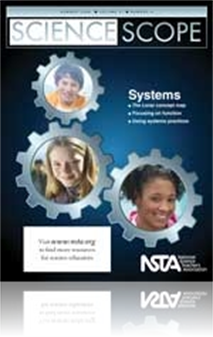All Science Scope resources
Journal Article
Scope on the Skies: Planets a go-go
The school year kicks off with a great parade of planets in the evening skies, as four of the six visible planets will make an appearance during the evening hours following sunset. For the first half of September, students will have an opportunity fo...
Journal Article
Earth Science Week (ESW) 2008 encourages people around the globe to open doors and investigate new opportunities. This year’s theme, “No Child Left Inside,” is a call to explore our natural environments. The celebration urges everyone—especia...
Journal Article
As educators, we know that math must be integrated into our subject to best communicate the essence of scientific investigation. Unfortunately, this is easier said than done when students learn subjects in isolated classrooms on a daily basis. As you...
Journal Article
Science Sampler: Inquiry goes outdoors—What can we learn at the pond?
The Oregon 4-H Wildlife Stewards program has been training teachers and volunteers to convert school grounds to education sites by constructing schoolyard wildlife habitats since 1997. The publication What Can We Learn at the Pond? 4-H Wildlife Stewa...
Journal Article
Science Sampler: The use of stations to develop inquiry skills and content for rock hounds
Teaching the rock cycle can overwhelm even the most enthusiastic rock hound. As middle school science teachers, we constantly struggle with an appropriate balance between Earth system content and experiential activities. The authors have found that s...
Journal Article
Scope on Safety: Safety is always in fashion
Unfortunately, what looks good on the runway often clashes with the science laboratory when it comes to safety. Therefore, given the potential risks associated with science activities in lab and on field experiences at the middle school level, the me...
Journal Article
Tried and True: Taking flight with an inquiry approach
This paper airplane lesson has been used with sixth-grade students to introduce scientific terms and concepts that students need to know before they design and conduct their own inquiry experiments. In addition to science concepts, mathematics skills...
Journal Article
Because eighth-grade curriculum standards focus in part on systems analysis and graphing, a lesson was created to enhance students’ analytical skills with the introduction of a type of graph, the node graph, which can be used to represent the inter...
Journal Article
Focusing on Function: Thinking Below the Surface of Complex Natural Systems
Structure-Behavior-Function (SBF) thinking considers the different levels of a system in terms of structures, behaviors, and functions, and how these are interconnected (Goel et al. 1996). This article presents an example of helping middle school st...
Journal Article
ISS EarthKam: Taking Photos of the Earth from Space
NASA is involved in a project involving the International Space Station (ISS) and an Earth-focused camera called EarthKam, where schools, and ultimately students, are allowed to remotely program the EarthKAM to take images. Here the author describes ...
Journal Article
Scope on Safety: Middle school science labs—A safety audit
In August 2007, a report titled “The State of Middle School and High School Science Labs in the Kansas City Region” was issued by the Kauffman Foundation, which is committed to improving student achievement in mathematics, science, and technology...
Journal Article
Teaching Science Through a Systems Approach
Based on the recommendation of the AAAS and the NRC, middle level science is the rightful introduction for a systems approach, including the study of its parts, subsystems, interconnections, and interrelationships. Dr. Seuss’s The Lorax provides an...




